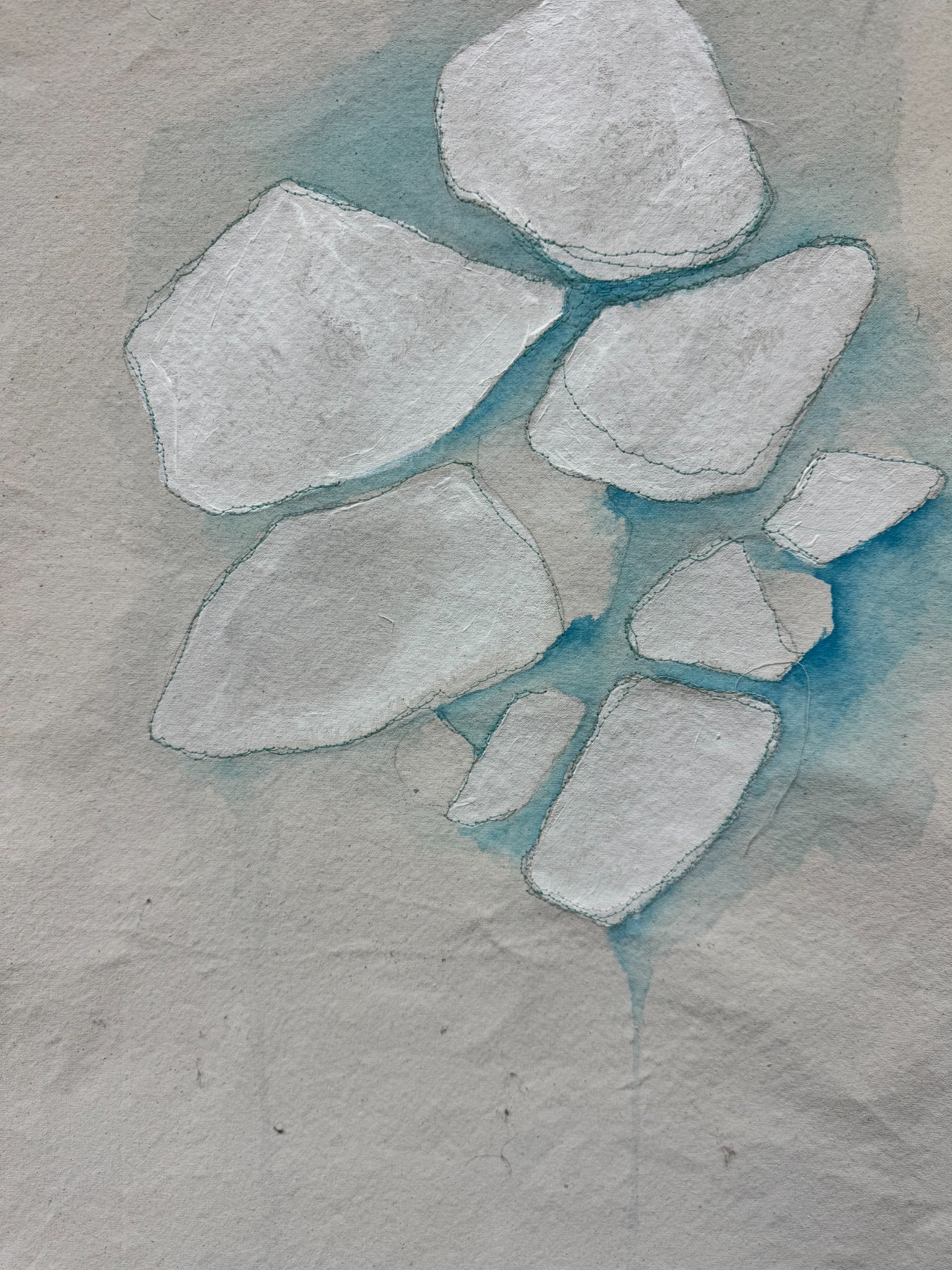Onder het ijs
By Ellen de Bruin
This excerpt is from Ellen de Bruin's debut novel, based on a real scientific expedition on the Arctic Ocean that took place in 2004, and that, in the novel, left from Svalbard.
She watches the rays of the sun that are bleaching and toning the tops of the grey mountains to a shiny blond. It’s the only thing happening right now: honey-coloured grazing light, rendering those old mountain tops gorgeously glossy. That’s all.
Good for them, those mountains. They’ve been through all sorts of things, and they’re showing it: snow has landed up there, over and over again; and each time it has melted, and the water has run down and got frozen along the way. Then it melted and froze and melted again, trickling down, fanning out more and more. It kept wearing away the softest parts of the rock, and that’s how that impressive triangular pattern came into being, like mountains etched into the mountainsides. Mountains piled on top of each other, separated by horizontal lines. If you look closely, you see that some determined supreme being has hatched them with even more and even thinner horizontal lines. You see how new layers of sediment have been deposited there, like annual rings. Everything happening over and over again.
But now there is only that sun and those mountains, in a moment that lasts until a certain someone starts thinking again.
Because yes, of course she’ll always start thinking again. That was her assignment, wasn’t it, just a week ago. Look carefully, Fretz, and think. Stick to the facts.
Bas Fretz moves her gaze to the parking lot. There are some SUVs. In front of them a row of large, roughly cube-shaped boulders that form a weird kind of wall, made of just as much hole as wall. And there’s a signpost to end all signposts. So why not take a good look at that. She is now 5.586 kilometers away from New York and 6.830 kilometers from Tokyo. But would that be very different if she were at home?
Oh wow: the North Pole is right there on the sign! It is 1.309 kilometers from here to the North Pole. And Tromsø is very close: less than a thousand kilometers. Hamburg, London and Paris are all about three thousand kilometres away – 2.743, 3.043 and 3.326 kilometres, to be precise.
The arrows on the sign point in all directions. Of course, no one has thought of putting a Dutch city on there.
Bas leans against the bus window. Her dirty blond hair will probably make a greasy stain on the glass, as if a hairy ball has crashed into it. It’ll look like Hystrichosphaeridium. Or Spiniferites.
Of course, she should have had her picture taken with the sign outside. That’s what people do when they come here. Under the white arrow showing the distance to London is the famous red-edged triangular warning sign with a white polar bear on a black background. She could get out of the bus now for that photo. She’s the first passenger, the driver is still outside, smoking; he could take that picture. But, well, maybe later.
God, those mountains, the golden yellow, the grey-white snow on their peaks. There’s a lot of emptiness here, but somehow it’s of a more benevolent kind than the emptiness she left behind at home. Everything seems bigger here. Not that there’s more of anything. Actually, there seems to be less of everything. Less colour, for instance. Except gray—she didn’t know there were so many shades of gray—and that gorgeous, sunlit blond. It’s as if the planet is bursting open in beauty just for her, here and now. As if the pictures on Reinier’s wall have come to life.
Okay.
Well, what did she think—that she wouldn’t have to think about him anymore, while she was here? She forces her gaze back to the polar bear sign. Bianca, she notices it now—damn it. The bear looks just like Bianca. Those angrily curved shoulders, the determined gait.
This is all guilt, of course, that she’s feeling. Calm down, Fretz. Stick to the facts.
Okay. Doing some math usually helps, it distracts her brain. Numbers. She looks at the signpost again. What a coincidence that London is exactly three hundred kilometers further away than Hamburg. If Paris were exactly seventeen kilometers further away, it would be exactly three hundred kilometers further away than London. She tries to think of a Dutch city for which that could be the case, but no, of course there isn’t one. Stupid.
She is too tired for this now.
It’s only a week ago that she heard of his death.
The bus slowly fills up with people, all with backpacks and in outdoor clothing. People who know each other, socializing, in groups of five, four, three, two. Perhaps she should make some small talk with them, but what can she say? She doesn’t know where that kind of talk comes from, how people do that; she doesn’t usually have very many words herself.
She looks at her papers. According to a hand-drawn map that she got, Gjestehuset 102 is at the other end of the town, almost out of Longyearbyen. Outside town you should always watch out for polar bears; that is emphasized in bold in three different places in the documentation that she has received. You can even rent guns in town. Not that you can just go and shoot a bear; that is only allowed if it is clearly self-defense. Bas had already read all of this, was fascinated by it, when Reinier was still going on the expedition himself and she wasn’t. First you have to try to scare the bear away with noise. And if that doesn’t work, if you have to shoot. If there’s really no other option, then you have to shoot to kill. Don’t aim at the head—it’s too small—aim at the chest or the shoulder. (The angrily curved shoulder.) Shoot until you are sure the bear is dead, because a wounded bear is the worst that can happen. And if you end up with a dead bear, you have to report it to the police immediately. Sysselmannen.
The whole idea that she could face a dangerous bear seems cartoonish to Bas, but she would probably have to walk further out of town than Gjestehuset 102 to meet one anyway.
The bus has started moving; it crawls through town, stopping every now and then to let out a group of people. It passes black and coloured wooden houses, two stories high, with pointed roofs that are so flat that they can only just be called pointed. Then the bus leaves the town. And stops again—what could it be: two, three kilometres further? It is always so hard to estimate distances when you are somewhere for the first time. There are only a few more buildings along the road and one of them has a yellow sign with black numbers on it: 102.
This is clearly outside town, Bas thinks. Polar bear territory. Being torn apart by a polar bear on Svalbard—that would be a nice ironic death. Not as nice as the ironic death of other people, of course.
Well, I have been doing this line of work for a while now, Fretz.
His voice again.
Out of the bus now.
In the distance the sun is still kissing the mountain tops, but down here a thick drizzle is barely falling, a kind of half-hearted fog. She feels it on her face, hoisting her bag up the rickety metal stairs of Gjestehuset 102.
Her room is small and square, and almost at the end of the corridor. Bas sits down on the single bed and looks around. The walls are boarded with planks of light-coloured wood, as is everything here—the reception, the corridor. It’s like spending the night in a sauna. A sauna with a window with tomato-red curtains, and two chairs upholstered in stiff dark green fabric. A cupboard, a washbasin, a mirror.
From the bed, through the window, she can see the mountains, with the beautiful Sierpinski triangles that erosion has worn into them and the snow-white, almost flat tops. The mountains that Reinier had pictures of on his office wall. She jumps up to do something, no matter what.
So she walks back into town along the road that the bus has just taken. The wind is damp and getting wilder, and eventually she is struggling for half an hour against a wet storm until she gets to the town centre: low houses, a few hotels, a handful of outdoor gear stores. While walking she hears a continuous vague high-pitched scream in the distance. The wind? Birds? Recently deceased people in a disappointing or even scary afterlife? Absurd thought. Two, three cars drive past her. The drivers ignore her.
She doesn’t see anything that looks like a café, so she enters Svalbardkiosken and lingers by the magazines. There’s three types: cars, firearms and porn. The Norwegian on the magazines vaguely resembles Dutch, as does spoken Norwegian. She heard it this morning at the Oslo airport. Norwegian sounds like Dutch in a nightmare where everyone seems to be speaking a familiar language, but suddenly you don’t understand anyone anymore.
Next to the kiosk is a large supermarket, Svalbardbutikken. There she buys a bag of trail mix, four apples, a carton of yoghurt and two spoons, just because they happen to be spoon-to-spoon in a pack. Dinner. She could have bought a microwave meal like a normal person, but then she would have had to check if there was a microwave at Gjestehuset 102. And she hasn’t.
Look carefully, Fretz, and think.
She grabs two cans of Arctic beer—‘Refreshingly Norwegian’. Outside, the soaking Arctic wind blows her back to Gjestehuset.
Eating on your own takes five minutes, and after that the evening spreads itself out like an uncrossable ocean. So much emptiness. And it is still so very light. On the door, next to the fire instructions, there’s a diagram attached with dirty yellow tape, showing her what she already knew: that it will not get dark again for an hour until the end of this month, around midnight.
On the wall opposite her bed is a framed photo of a lonely penguin on snowy rocks, because, well, of course, someone can be even further from home than she is now. And above the bed is a photo, taken from inside, through a window, of a polar bear, outside, pushing the hairy sole of his right front paw against that window. It is a very similar window to the one here in her room, framed with blank wood. The bear looks like an angry white cat that wants to get in. Like Bianca, the cat she left behind in Amsterdam. Reinier’s cat.
Ellen de Bruin is an Amsterdam-based psychologist and science writer who has written five books.


0 Comments Add a Comment?